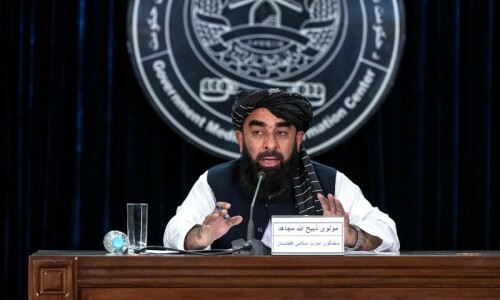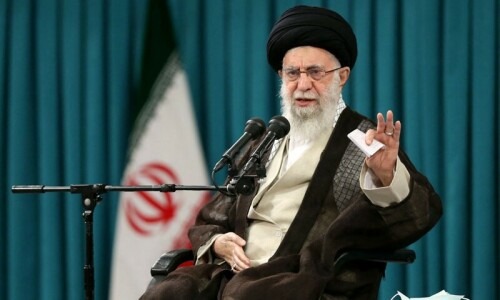ANKARA: At 9.05 am on Monday, air-raid sirens will wail across Turkish cities, morning rush-hour traffic will halt and schoolchildren will stand to attention.
Turks will observe a minute’s silence, as they have on Nov 10 for 65 years, to mark the death of Mustafa Kemal Ataturk, founder of the Turkish republic.
Western visitors are often surprised and perhaps a little discomforted by the Turks’ almost mystical reverence for the soldier-statesman whose lean, dapper features adorn the walls of shops, offices, cafes and homes across this sprawling nation.
But Ataturk was no ordinary leader. After wresting Turkey’s independence from occupying armies after World War One he led a cultural revolution which curtailed the power of the mullahs, introduced the Latin script and gave women the vote.
In the process, he created a Westward-looking Turkey which is viewed by many today as the best proof in the post-September 11 world that Islam and democracy do indeed mix.
“Ataturk’s message is that East and West can meet on the ground of universal, secular values and mutual respect,” wrote Andrew Mango in a recent biography of Turkey’s first president. Ataturk, who died aged 58 from cirrhosis of the liver in an Istanbul palace that once belonged to the Ottoman sultans he deposed, has certainly stood the test of time better than many of the other great revolutionary leaders of the last century.
The mummified remains of Soviet founder Vladimir Lenin and China’s Mao Zedong may still lie on public display in Moscow and Beijing respectively, but much of their allure has faded with the collapse of communism.
In Turkey, an aspiring member of the European Union which professes the values of Western democracy, Ataturk remains secure in the affections of his countrymen, a mentor for pro-Western liberals and conservative nationalists alike.
“We believe Ataturk is still relevant today because his thoughts are not a dogma. That is why he could survive so long,” said Onur Oymen, a member of parliament for the Republican People’s Party (CHP), the party Ataturk founded.
“Twentieth century leaders such as Lenin, Mao, (Soviet dictator Josef) Stalin are outdated because they stuck with a dogma, an ideology. Ataturk was a pragmatist guided by reason and so his ideas remain valid,” Oymen told Reuters.
Despite Turks’ continuing attachment to Ataturk, many are critical of the way in which his self-styled followers, known as Kemalists, have ruled the country since his death.
“Ataturk has been taken hostage by the militarists, by the bureaucracy, to defend the status quo. But that is contrary to what Ataturk stood for. He was a manager of radical change,” said Dogu Ergil of Ankara University. “They won’t let Ataturk rest in peace, they need him to legitimise their hold on power,” said Ergil.
Turkey’s so-called “deep state” — comprising the powerful military and conservative bureaucrats and judges — views itself as the guarantor of Ataturk’s legacy, especially the strictly secular system of government he established.
But the rigidity of their interpretation of Ataturk’s philosophy has created tensions within Turkish society which have regularly erupted into the political arena, Ergil said.
For example, last month’s celebrations to mark the 80th anniversary of the founding of Ataturk’s republic were marred by a dispute over headscarves, a traditional flashpoint in Turkey.
President Ahmet Necdet Sezer, a staunch secularist, declined to invite headscarf-wearing wives of lawmakers to his reception.
The move was especially controversial because most of the lawmakers involved were from the ruling AKP party, which has Islamist roots and is distrusted by the secular establishment.
The AKP government denies any Islamist agenda and has made Turkey’s membership of the European Union its central political aim, one that analysts say Ataturk would have backed heartily.
“I see Ataturk very much in the pro-EU camp, very pro-Western,” said Ergil.
During his rule, Ataturk borrowed enthusiastically from Western countries in modernising Turkey, for example copying the German commercial code and Swiss laws on bankruptcy. In foreign policy, he courted the Western democracies, notably Britain and France, and had little time for the communist, fascist and Nazi ideologies then gaining ground.
But for all his merits as a leader, some Turks think the time has come to stop looking back to Ataturk for inspiration.—Reuters















































Dear visitor, the comments section is undergoing an overhaul and will return soon.